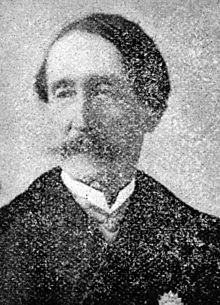Henry Bergh
| Henry Bergh | |
|---|---|

From Who-When-What Book, 1900
|
|
| Born |
Henry Bergh August 29, 1813 New York City |
| Died | March 12, 1888 (aged 74) New York City |
| Occupation | Diplomat, activist for humane treatment of animals and children |
| Known for | Founding the American Society for the Prevention of Cruelty to Animals, helping found the Massachusetts Society for the Prevention of Cruelty to Children |
| Spouse(s) | Catherine Matilda Taylor |
| Parent(s) | Christian Bergh |
| Signature | |
Henry Bergh (August 29, 1813 – March 12, 1888) founded the American Society for the Prevention of Cruelty to Animals (ASPCA) in April, 1866, three days after the first effective legislation against animal cruelty in the United States was passed into law by the New York State Legislature. Bergh also prompted the formation, in 1874, of the Massachusetts Society for the Prevention of Cruelty to Children (MSPCC).
Bergh was born in New York City and studied at Columbia College, after which he worked in his fathers' shipyard. After the shipyard was sold, Bergh received a share of the inheritance and set forth on a lengthy journey throughout Western Europe with his young bride, Catherine Matilda Taylor.
In 1862, Bergh was appointed secretary and acting vice-consul to the American legation in St. Petersburg, Russia by then President Abraham Lincoln. The severity of the climate obliged him to resign in 1864, and he traveled extensively in Europe and the Orient.
On returning to the United States, Bergh resolved to work on behalf of animal welfare. Cruelties witnessed in Europe first suggested his mission. Alone, in the face of indifference, opposition, and ridicule, he began working as a speaker and lecturer, but most of all in the street and the courtroom, and before the legislature. His cause gained friends and rapidly increased in influence. The legislature passed the laws prepared by him, and on April 10, 1866 the ASPCA was legally organized, with Bergh as president.
The association moved steadily forward, and by August was in a flourishing condition financially, having received a valuable property from Bergh and his wife. In 1871 a Parisian, Louis Bonard, who lived with extreme simplicity in New York, died and left $150,000 to the Society, which permitted a move to larger quarters, better adapted to its work, a building at the corner of 4th Avenue and 22nd Street.
During 1873 Bergh made a lecturing tour in the western U.S., which resulted in the formation of several societies similar to that in New York. He spoke before the Evangelical Alliance and Episcopal convention, and was the means of having a new canon confirmed, to the effect that Protestant Episcopal clergyman should at least once a year preach a sermon on cruelty and mercy to animals.
...
Wikipedia
